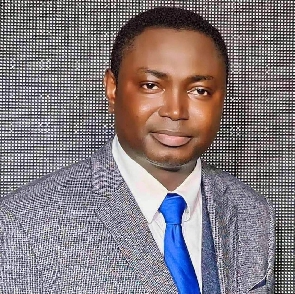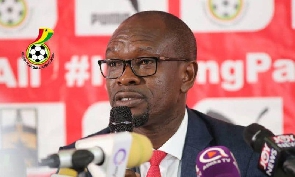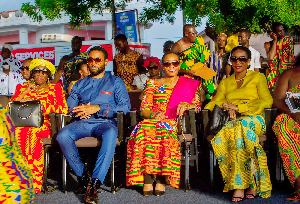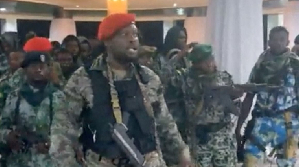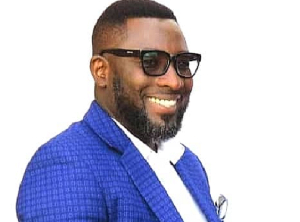Opinions of Sunday, 30 April 2023
Columnist: Ambassador Dr. Maxwell A. Hagan
A culture of peace against a culture of violence
Peace is a universal language. Yet the world is at war morally, spiritually, and in all spheres of life. Mankind does not understand the purpose of creation, so we destroy our beautiful world with violence.
The culture of violence has almost become normal in our already struggling world. Nevertheless, the greatest resource of building a culture of peace is the people themselves. It is through them that peaceful relationships and structures are built. Educating people to understand the importance of peace should be the burden of every law abiding citizen.
According to the World Health Organization, “Each year, more than 1.6 million people worldwide lose their lives to violence. For every person who dies as a result of violence, many more are injured and suffer from a range of physical, sexual, reproductive, and mental health problems. Violence places a massive burden on national economies in health care, law enforcement, and lost productivity.”
The world has an increase of violence against women, the poor, less privileged, and children as most people fall into the hands of abusers. Abuse at work, family, politics, etc. has almost become normal since most abused have no power to defend themselves. Some live their daily lives in pain and anger as they seek for a day to take revenge. This is why we must work tirelessly to build a peaceful environment through reconciliation and forgiveness. This is only possible through peace education.
Building a peaceful world should be the desire and work of all peace loving people. Peace is like the water that quenches the raging fire. It is needed in every sphere of life. As much as we all desire to live peacefully, the lack of understanding and balance of our individual differences has always been the foundation of violence. We can never build beautiful communities with a violent attitude. This is why I advocate for peace education. I believe it should be a critical part of school curriculum. It should also be part of foundational training for all job offers. Families and various groups should make it a habit to pursue peace.
A peaceful country is a prosperous country. Prosperity is not all about the amount of money and infrastructural achievements under one’s authority. Without peace, no dream may see the light of day. When we do not place value on peace, we may lose precious achievements through violence. No one calls for violence. Even the so-called violent person sometimes desires peace of mind and heart. However our fallen nature as humans has become our stumbling block to pursuing peace.
To overcome the culture of violence, we should pursue peace in a holistic approach. Such is done by first understanding the seven important pillars of society that establishes nations. These pillars are religion, family, education, government, business, media, and arts and entertainment.
When the government establishes a strategic peace plan on these pillars of society, it will progress national peace. Having a peace council is good but everyone should be made to understand that he or she is a peace council member within their own sphere in the society. They are peace advocates and are responsible to maintaining peace and order in their part of the country. Where there is no peace, there is no order; and where there is no order, there is no progress.
Peace education is paramount to the progress of nations
Peace education is not all about lectures on peace; instead it is about our attitude, values, and knowledge that focus on a peaceful co-existence with others, our environment, and one’s self. Peace therefore is a way of living together so that all can accomplish their God-given dreams and purpose on earth.
Nations that seeks Peace should understand this holistic approach of peace: empowering good attitude, values, and knowledge. With these three (AVK), our society will have a good foundation for peace. I advocate therefore for peace education to be taught from our homes, schools, and offices; and most especially, to have strategic seminars on peace for all who seek to hold public office not forgetting the private sector.
Peace education will mature the inner morals and birth practical ethics for daily living. In other words, peace education will nurture dispositions and attitudes that are necessary for engaging in transformative action for peaceful change. Peace education should focus on the now and the future.
As stated earlier, talking about peace is not enough, teaching and taking peaceful actions are needed. One should envision peace and work towards it. In the day where opinions and pride seem to overrule reasoning, we must be quick to campaign and take actions of peace. Peace is not a tribe, it is not a nation, neither is it a language; instead, we are all agents of peace. Our personality and actions should be that of peace makers. Peace is light. It takes away darkness (violence).
Our understanding of God’s purpose for humanity is the very foundation of peace. As the Bible states, “lack of knowledge my people perish”. When proper lessons of peace are not addressed, our beautiful communities may soon be destroyed by ourselves.
The youth for peace advocacy
The world is in a situation where some influential old ones are insisting the next generation to accomplish their unhealthy political agenda. The call for violence and indoctrinate the young to fight for their rights, while the main motive behind such is for personal gains. When their children enjoy luxury, the innocent youth dies in conflict so they can achieve their dreams. Just like in the days of Absalom, 2 Samuel 15:11 - Two hundred men from Jerusalem accompanied Absalom. They had been invited as guests and they went along innocently, for they knew nothing about the matter.
Today, most young men who have good dreams for themselves and their country have fallen into the hands of warmongers. These young ones have great dreams but without proper direction. This is why some political god-fathers are using them to accomplish their evil goals.
Peace education and remembrance of history will help our generation and beyond to value a culture of peace against that of violence. Ironically, most young ones have no idea of what war and its unbearable effects looks like. We have to learn from the past and make efforts to avoid the reoccurrence of terrible events against humanity where previous generations lived through. I believe that if peace education will be a reality, government and all peace loving people should encourage our young ones to be at the center stage of peace advocacy. Civil society organizations can play a major role in helping shape the next generation.
Violence has no beauty
When we look down on human rights violations today, it may pave the way for future violence. When was the last time someone was awarded for being violent? Is there ever a university awarding certificate for those who commit crimes against humanity? Indeed, there is no beauty in violence. Communicating peace and conflict can be crucial in a world where everyone is right in their own eyes. Daily rumors of war, signs of chaos and social disturbances and fears are all founded on the ego-based nature of mankind. Human culture of selfishness, greed, etc. has led to the destruction of millions of lives which has affected our beautiful environment.
Whenever people value violence than peace, their progress delays. There are many causes of violence, some of which is discrimination, lack of accountability, and Rule of Law. According to the United Nations “Human rights are universal and inalienable; indivisible; interdependent and interrelated. They are universal because everyone is born with and possess the same rights, regardless of where they live; their gender or race; or their religious, cultural, or ethnic background.
Inalienable because people’s rights can never be taken away. Indivisible and interdependent because all rights – political, civil, social, cultural, and economic – are equal in importance and none can be fully enjoyed without the others.
They apply to all equally and all have the right to participate in decisions that affect their lives. They are upheld by the rule of law and strengthened through legitimate claims for duty-bearers to be accountable to international standards”. When this statement is misinterpreted, violence becomes the center stage of communities.
Modern day political consumerism and exploitation – A danger for peace
The modern day political consumerism and exploitation of the people’s right is one key danger that blocks the path of peace. Many leaders are without any discipline, integrity, and principle. The world of politics, religion, etc. are almost controlled by the “all-consuming individual” called a leader. In the Bible, Jesus Christ fed five thousand but in our world today, the five thousand feeds the leader.
When such leaders occupy positions they abuse the people and dishonor public office. When the most fundamental rights to life - to those that make life worth living; such as the rights to food, education, work, health, and liberty are taken from the people, they fight back. Ironically, out of anger, most do not use the right way to seek justice; hence, violence becomes their only option.
SOLUTIONS: In order to achieve peace within the borders of the nation;
1. Government should be intentional about practical peace education programmes which include conflict resolution techniques, democracy, disarmament, gender equality, human rights, environmental responsibility, history, communication skills, coexistence, and international understanding and tolerance of diversity.
2. Appoint peace educators to teach people of all ages, in both formal and informal settings. Programmes exist at local, national, and international levels; and in times of peace, conflict, and post-conflict. You don’t need to spend millions to control violence while the people can be taught to save themselves from harm’s way.
3. Have a public dialogue among different factions of society. Let them share ideas on peace advocacy. Each Community May have their own challenge. Instead of debating on unrealistic topics, peace education programmes can be organized for civil society groups, schools, tribal leaders, and the media. Let’s understand that peace is normally determined by culture and context.
4. Peace education approaches should aim to go beyond curriculum development and must be geared towards building particular competencies, values, and practices that can be effectively applied outside the classroom. Formal schools do not only provide knowledge and skills, but they also shape social and cultural values, norms, attitudes and dispositions. It has been proved that peace education interventions in schools result in improved attitudes and cooperation among pupils, and decreased violence and dropout rates.
Have a one day special “Peace Seminar” during or before vacation:
a. To promote healthy relationships and a peaceful school culture
b. To address structural and cultural violence within schools and our communities
c. To teach on the proper use of social media that brings peace and prosperity
Believing in change
Believe in change instead of violence. Change may not be instant but it surely comes when we do not give up. Believe in yourself. Believe in your nation, regardless of how bad it is today; your nation changes at the extent of your change. Political leaders and senior policy-makers aspiring to deal with the root causes of conflict should promote peace education as one of their manifestos. Educating people with book knowledge without heart-knowledge (good morals) leads to pride in leadership. Every religion speaks of peace, yet many religious countries see more violence. The problem is not the religion; it is the lack of understanding on our unity as one people. Say no to violence and embrace peace.
Believe in human right
“All peoples shall have the right to national and international peace and security.”
African Charter on Human and People's Rights, Article 23
“All persons have a right to peace so that they can fully develop all their capacities, physical, intellectual, moral and spiritual, without being the target of any kind of violence.”
Asian Human Rights Charter, 1998, paragraph 4.1
Ambassador Dr. Maxwell A. Hagan
Country Director – International Association of World peace Advocates (IAWPA) – Philippines
International Coordinator: IAWPA – Asia and the Pacific

